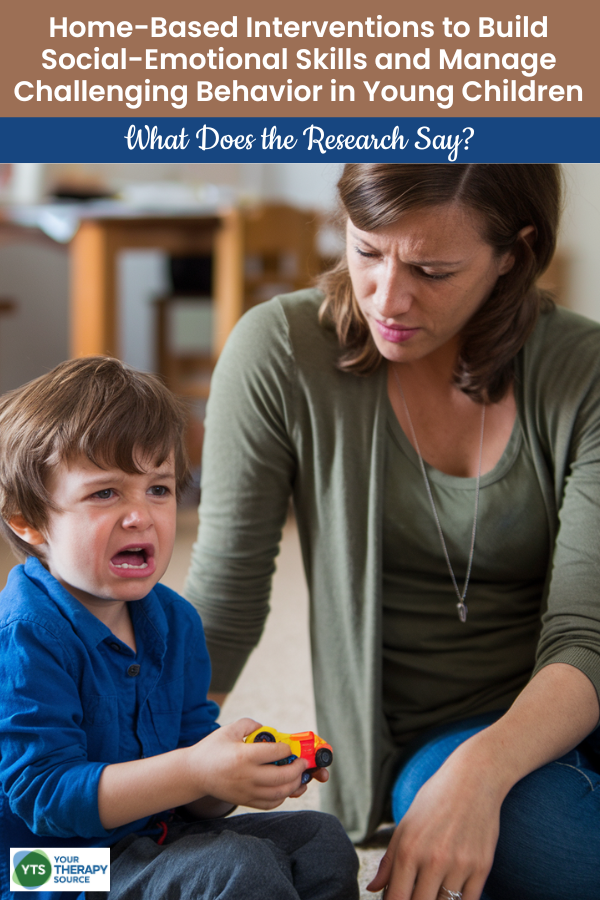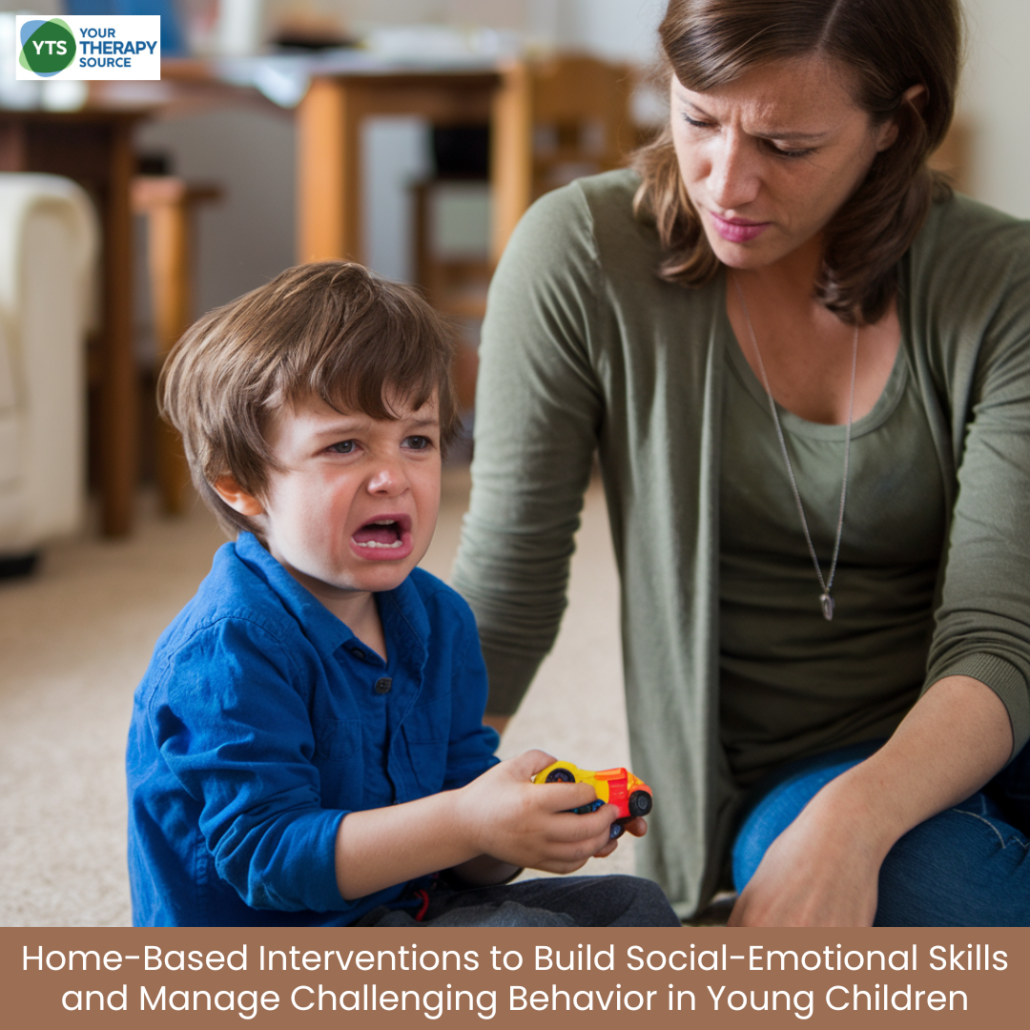Home-Based Interventions to Build Social-Emotional Skills and Manage Challenging Behavior in Young Children
Young children with developmental delays or disabilities often struggle with social-emotional skills and managing challenging behaviors, such as aggression, tantrums, and self-injury. Research shows these difficulties, if untreated, can lead to poor long-term outcomes, including lower academic performance, social exclusion, and increased caregiver stress. However, home-based interventions to build social-emotional skills, which involve training caregivers to implement evidence-based strategies, have shown promise in improving these outcomes.

Key Research Findings on Home-Based Interventions to Build Social-Emotional Skills
A 2024 systematic review of 57 studies analyzed the effectiveness of home-based interventions for young children with developmental delays and disabilities. These findings underline the importance of empowering caregivers to use evidence-based practices effectively, with professional coaching serving as a critical component:
- Efficacy of Interventions: 67% of the studies meeting design standards showed moderate to strong evidence of effectiveness in improving social-emotional skills and reducing challenging behaviors.
- Common Strategies Used:
- Differential reinforcement (31% of studies).
- Functional communication training (FCT) (31% of studies).
- Antecedent-based interventions (48% of studies).
- Caregiver Role: Caregivers implemented interventions with high fidelity in most studies when coached by professionals using verbal instructions, modeling, and feedback.
- Social Validity: Caregivers consistently rated interventions as acceptable, feasible, and beneficial.
Building Social-Emotional Skills at Home
Social-emotional skills include recognizing and managing emotions, forming relationships, and engaging in appropriate behaviors. Based on the research, effective strategies for teaching these skills include:
1. Functional Communication Training (FCT)
- Teaches children alternative, functional ways to express their needs, reducing reliance on challenging behaviors.
- Example: A child learns to use a picture card to request a toy instead of crying.
2. Antecedent-Based Interventions
- Adjust the child’s environment to prevent triggers for challenging behaviors.
- Examples:
- Introduce a visual schedule to provide structure.
- Offer sensory breaks to prevent overstimulation.
3. Naturalistic Interventions
- Embed learning opportunities into everyday activities.
- Example: Practice turn-taking during a family board game, reinforcing positive interactions.
4. Reinforcement Techniques
- Reinforce positive behaviors with praise or rewards.
- Research Tip: Combine reinforcement with strategies like antecedent interventions for greater success.
Addressing Challenging Behaviors
The review identified common intervention techniques for reducing challenging behaviors, including:
1. Differential Reinforcement
- Reward appropriate alternative behaviors while withholding reinforcement for problematic behaviors.
- Example: Praise a child for using words to ask for help instead of throwing objects.
2. Prompting and Modeling
- Demonstrate desired behaviors and provide step-by-step guidance.
- Gradually reduce prompts as the child gains confidence and independence.
3. Response Interruption and Redirection
- Interrupt inappropriate behaviors and redirect the child to a more acceptable activity.
- Example: If a child starts hitting, redirect them to squeeze a stress ball instead.
4. Behavioral Assessments
- Conduct functional assessments to identify the root causes of behaviors.
- Finding: Studies showed behavior often served functions like seeking attention or avoiding tasks, highlighting the need for individualized interventions.
Coaching Caregivers for Success
The research emphasizes that caregiver involvement is critical for sustaining improvements. Effective coaching strategies include:
1. Verbal and Written Instructions
- Use clear, jargon-free language to explain intervention steps.
- Research Example: Studies found written instructions, combined with verbal explanations, improved caregiver understanding and implementation.
2. Modeling and Role-Playing
- Demonstrate techniques and encourage caregivers to practice.
- Finding: Role-playing without the child increased caregiver confidence and fidelity.
3. Feedback and Data Review
- Provide immediate feedback during practice sessions.
- Use data or visual graphs to track progress and adjust interventions.
4. Collaborative Problem-Solving
- Work with caregivers to address challenges and refine strategies.
- Tip: Engage families in setting goals to ensure interventions align with their needs.
Practical Insights for Educators and Therapists
Home-based interventions require tailoring strategies to the family’s circumstances. Professionals can enhance caregiver success by:
- Integrating Interventions Into Daily Routines: Encourage families to practice skills during meals, playtime, or bedtime.
- Using Low-Cost, Accessible Tools: Materials like picture cards, timers, or visual schedules are effective and affordable.
- Monitoring Stress Levels: Support caregivers with resources for managing stress, as caregiver well-being influences implementation fidelity.
- Celebrating Small Wins: Recognize progress to build motivation and resilience in both children and caregivers.
Challenges and Recommendations
While home-based interventions are effective, the review highlighted challenges that professionals should address:
- Barrier: Caregivers reported difficulties sustaining interventions without ongoing support.
- Solution: Schedule regular check-ins to provide reinforcement and troubleshoot issues.
- Barrier: Limited professional training in delivering social-emotional skills interventions.
- Solution: Advocate for additional training and resources for early intervention professionals.
- Barrier: Gaps in equity and representation in the research.
- Solution: Design studies and interventions that reflect diverse populations to ensure broader applicability.
Why Home-Based Interventions to Build Social-Emotional Skills Matter
The research underscores that empowering caregivers through evidence-based coaching leads to significant improvements in children’s social-emotional skills and behavior. These interventions also reduce caregiver stress and enhance family dynamics, paving the way for long-term positive outcomes.
Home-based interventions are a practical, effective solution for addressing social-emotional skills and challenging behaviors in young children with developmental delays. By leveraging evidence-based strategies such as functional communication training, antecedent-based interventions, and caregiver coaching, professionals can empower families to create lasting change.
With the right support, caregivers can transform their home environment into a nurturing space where children thrive.
References
Gerow, S., Exline, E., Swafford, L., Cosottile, D., Conroy, M., Machalicek, W., Davis, T. N., Wei, Q., & James, A. (2024). Addressing challenging behavior and social–emotional skills in home-based services: A systematic review. Journal of Positive Behavior Interventions, 26(4), 241–256. https://doi.org/10.1177/10983007241276423
More Helpful Resource
- Social Emotional Teaching Strategies: Explore effective methods for teaching social-emotional skills, especially to students with emotional and behavioral disorders.
- Behavior IEP Goals: Learn about setting individualized education program (IEP) goals focused on improving behavior and social skills in the classroom.
- Accommodations for Students with Emotional and Behavioral Disorders: Discover accommodations and modifications to support students facing emotional and behavioral challenges.
- Social Emotional IEP Goals: Understand the importance of social-emotional IEP goals and how they contribute to a child’s success in school and life.
- Social Emotional Learning: Delve into strategies for fostering social-emotional learning in young children, emphasizing the role of a safe and empathetic environment.
- 10 Emotional Regulation Activities for Kids: Access a list of activities designed to help children develop emotional regulation skills, crucial for their overall well-being.
- How Does Social and Emotional Development Affect Learning?: Examine the impact of social and emotional development on a child’s learning process and academic success.
- Co-Regulation – Definition and Strategies: Learn about co-regulation and discover strategies to support children in managing their emotions effectively.
- Self Regulation IEP Goals: Find examples and tips for setting self-regulation goals within an IEP framework to support children’s emotional development.
- Perspective Taking IEP Goals – Examples and Tips: Gain insights into creating IEP goals that enhance a child’s ability to understand others’ perspectives, fostering empathy and social skills.



